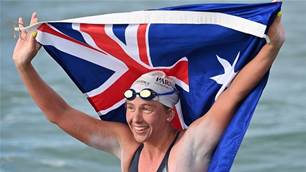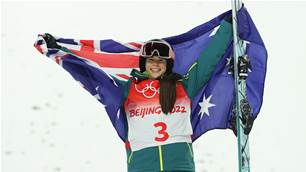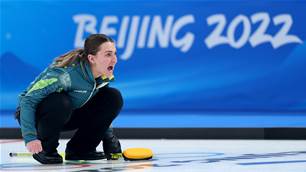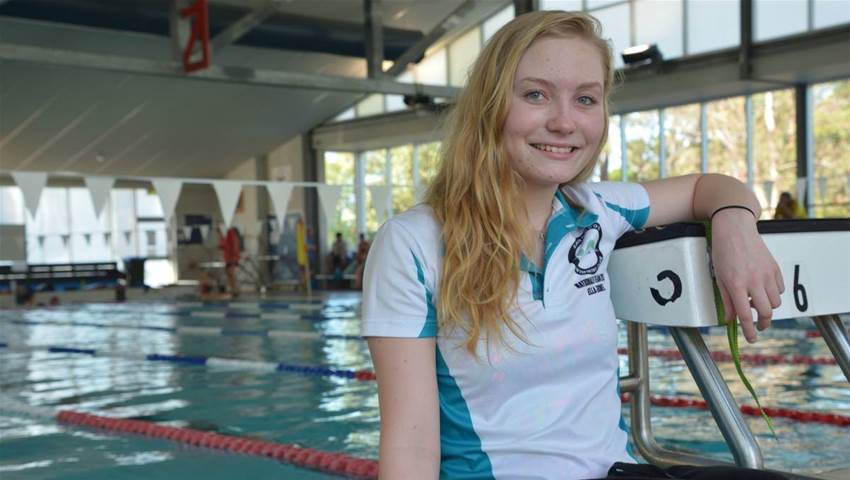Ella Jones’s selection to represent Australia at the World Para-swimming Championships after only three years as a swimmer is evidence of her extraordinary persistence.
The 18-year-old has never let conforming – or her disability – get in the way of success.
Three short years ago, Ella Jones would not have picked herself as representing her country in an international swimming competition. In April she got the news that she’d made the Australian Dolphins team.
The teenager is heading for the World Para-swimming Championships in London in September, one of nine new members of the 34-strong squad.
A good showing in London will see her in line for the Paralympic Games in Tokyo in 2020. The achievement is all the more extraordinary as Ella, who has cerebral palsy, only began swimming at age 15.
"The most exercise I’d done before I started swimming was running after the ice-cream truck," she said.
"If you’d told me as a chubby 15-year-old I’d make the world para championships, I’d go yeah, righto."
Ella’s mum, Sharon, persuaded her to try swimming because she needed something to do.
"I was being a right 15-year-old ratbag, every parent’s worst nightmare," Jones said.
"I’d tried other sports but nothing really clicked."
She’d had a go at swimming at 14, in a class with six-year-olds near her home in western Sydney. After a few lessons, the instructor told Sharon that she was never going to be a very good swimmer.
Sharon was having none of it and took her to the pool at Springwood in the Blue Mountains. Nick Robinson, who specialises in coaching kids with disabilities, spotted her potential. He arranged with Sharon to train her.
"From the first session I knew she had the ability to go all the way," he said.
She’s lost 23 kilograms since then. Sitting at the side of the pool in her gym training gear, her blonde hair piled on top of her head, she looks every bit the athlete.
As well as swimming, losing the weight meant cutting out daily trips to the fish and chip shop with her school friends.
"I was so unfit," she recalls.
"When I got to the end of 25 metres I would hang over the edge, absolutely dying."
She can now swim five or six-kilometre sets for hours each day and fits in several gym sessions a week. Since her selection for the Dolphins, she has added weekly strength and conditioning sessions with a trainer with who specialises in training athletes with cerebral palsy. She’s had to sacrifice a lot to get there.
For one thing, conventional school had to go by the wayside. She signed up with the TAFE Pathways last year but has had to let that go too.
"I was really struggling to get it all done; struggling to get help. When you train by yourself and you’re doing all your schoolwork by yourself, you want a bit of human interaction," she said.
She’s now completing a bridging course to study midwifery at university.
Her biggest sacrifices, however, have been social. The bubbly and gregarious teenager finds missing out on birthday parties and the like can be isolating but it’s the everyday interactions she misses most.
"It’s the little things, teenage normalcy stuff like going to the pub for the first time," she said.
Because of her heavy training schedule and swim meets, Ella didn’t have her ritual first night in the pub until three months after her birthday.
It’s given her wisdom beyond her 18 years.
"You definitely lose friends, she says, ‘but the ones that you lose are the ones you don’t mind losing. I realise now that they weren’t friends anyway. You have to grow up really quickly, but it's totally worth it."
Her drive is extraordinary.
Her coach Nick said, "Of every swimmer I’ve had, there’s none that wants to give more time and effort than Ella. I’ve seen her lie on the edge of the pool, shaking like a leaf, not able to move."
Ella is one of triplets with Daniel and Georgia, and also has an older brother, Joshua. The family is sporty. Mum Sharon and Dad Chris were keen netball and soccer players, and her siblings have followed in their footsteps. They’re close-knit and like to get together with their extended family.
"We don‘t have to do anything big, as long as we’re together," she said.
"We’re all a little bit crazy and so it’s a lot of fun."
Her family never treated her differently because of her cerebral palsy, for which she is hugely grateful.
"They’ll have a joke about it, and that’s really helped me to be okay with it and take the piss out of myself."
Early childhood was tough at times. Her mum would stretch Ella’s legs each morning so that she could manage to get out of bed and get ready for school. Teachers aids would help her move around, but this didn’t stop her being shoved down the stairs on one occasion. Girls didn’t want to play with her because they thought her cerebral palsy was contagious.
"I didn’t have my own understanding of how CP affected my body, so how could I explain that to another kid? I thought you can’t catch CP. If that was the case my brother and sister would have it right now. I was obviously different and got picked on a bit."
Ever wise and resilient, she adds, "But hey, I think maybe everybody’s got a story like that. I don’t think it was specifically because of my CP."
Ella’s classification for the para-swimming is S8, for swimmers with full use of their arms and trunk and some leg movement because of how CP affects her, she swims freestyle and backstroke and finds breaststroke too painful on her legs.
Freestyle is her strongest stroke, as she’s predominantly arms-based.
"I lack spatial awareness below my waist," she said.
"When I ‘m in the water, if I’m not looking at my legs I have no idea where they are."
Her starts and turns are the same as for an able-bodied swimmer, but she doesn’t get the same distance and thrust from them. Although cerebral palsy affects everybody differently, one of the characteristics of swimmers with CP is that they fatigue easily. Tiredness increases clonus, a neurologically induced muscle spasm that causes shaking.
In London, Ella will swim against only those in the S8 class for the first time.
In Australia there are not enough para-swimmers to hold separate events in each category, so places are determined by times swum. The closer a swimmer gets to the world record in their classification, the more points they win. She’s the only competitive S8 swimmer in Australia and the only female S8 on the team.
For the first time, Ella will swim a race where the winner is she who hits the wall first.
"After a race, I physically can’t hold myself up," Jones said.
She has a wheelchair waiting for her at the end of the pool, which she uses to get herself over to the warm-down pool.
"I’ll shake for a little bit, and then I just put on my fins, plop into the pool and do my warm-down. And then I’m pretty much good again."
That’s a good summation of Ella’s approach to life. Train like crazy and then try your heart out. Have the help you need close to hand, fall down in a shaking heap when you need to, and then get up and just keep on going until you win.
Related Articles

Australian Chloë McCardel is now Queen of the English Channel

Australia Winter Olympics gold-medal drought ended by Jakara Anthony













